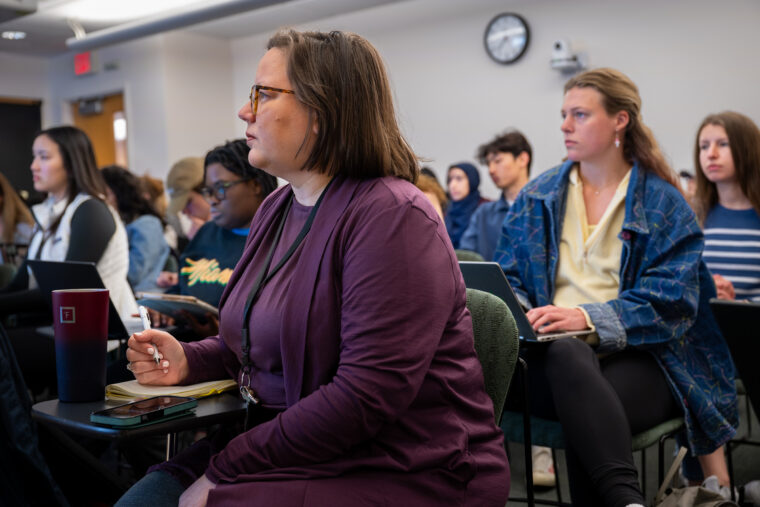
Women's health through the lifespan has been getting a new focus in recent years from the local to the federal level, with President Joe Biden recently launching initiatives to boost federally funded research in this long-overlooked area. That focus is also active in the McKelvey School of Engineering at Washington University in St. Louis, where a new Department of Biomedical Engineering elective course is filled with students interested in how they can use engineering to solve problems in women's health.
The "Engineering for Women's Health" course (BME 4780/5780), available to undergraduate and graduate students, is taught by Michelle Oyen, an associate professor of biomedical engineering and director of the Center for Women's Health Engineering. Initially, Oyen offered 16 seats in the course, but demand quickly led her to increase the number of students to 48.
The course includes lectures on women's reproductive anatomy and physiology, guest speakers from FemTech (technology focused on women's health) companies and startups, research scientists from the School of Medicine, case studies and panel discussions.
"When we pull in the engineers from these startup companies, students can talk to the people who work in real jobs in the field," Oyen said. "The FemTech sector has a lot of startups in women's health, which is a trillion-dollar market. There are a lot of opportunities for young engineers to work in this space."
One class meeting recently featured Christine O'Brien, an assistant professor of biomedical engineering and co-founder and chief scientific officer of Armor Medical Inc., and Kelsey Mayo, co-founder and CEO of Armor Medical. O'Brien and Mayo presented students with their investor pitch and details about how the company got started. They also shared information about their device, a wrist-worn early monitoring system for obstetric hemorrhage, severe blood loss that occurs in 5% of all births and is 90% preventable if detected and treated early.
Mayo, who survived hemorrhage, told students the company is her "passion project" and encouraged them to find their own.
"Your day job should be where your passion meets the world's needs," she said. "That's a cool thing for biomedical engineers to consider."
Oyen said focusing on the FemTech sector is important for students' education and gives them an idea of what they can do after they graduate.
"Part of what has happened over the past decade is shining a light on the fact that there are all these issues that were once only whispered about by women and not brought out into the open," Oyen said. "People have now realized this is really important because there are unmet needs in health care, which has huge implications. The two most common surgeries for women are a C-section and a hysterectomy. Half of women have a hysterectomy by age 65, which is huge."
In the course, students are completing group projects to address needs in women's health, including menopause, osteoporosis, hip fractures and lack of muscle mass.
Annika Avula, a dual-degree student earning a bachelor's and a master's in biomedical engineering, said she wanted to take this course after taking O'Brien's course "Quantitative Physiology II" (BME 301B) last fall.
"It really opened so many people's eyes to things that can be done for women's health," Avula said. "This course has introduced me to a new way of thinking. I'm more interested in problems and more called to ask questions."
Ella Hanson, a senior earning a bachelor's and a master's in biomedical engineering, said she took the course because of her interest in women's health problems.
"Dr. Oyen and Dr. O'Brien are addressing the huge gap in BME in the women's health field," Hanson said. "We are learning that there are more opportunities out there in engineering beyond orthopedics and other biomedical problems."
Avula's group project is looking at the effects of menopause, and Hanson's group project is looking at endometriosis, a chronic disease that affects 11% of women of reproductive age in the U.S. and for which there is no cure.
Oyen said that while it took her some time to get comfortable using words about women's health in front of audiences, her students are open to talking about women's health issues and using the vocabulary, which she finds encouraging for future generations.
"I realized that I'm not going to be the one to change the world, but I'm going to teach the ones who will," Oyen said.
Originally published on the McKelvey School of Engineering website






